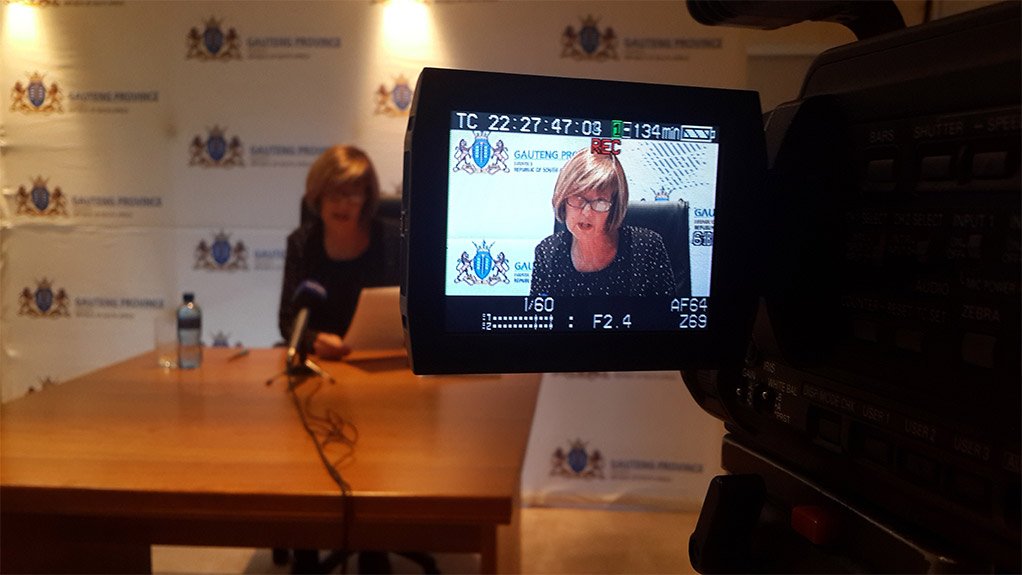The Gauteng Provincial Government (GPG) exceeded its targeted revenue for the 2014/15 year by R700-million, or 16%, collecting R4.96-billion for the year, Gauteng Finance MEC Barbara Creecy revealed during her presentation of the State of Finances Report for the Fourth Quarter to the Gauteng Provincial Legislature (GPL) on Thursday.
The Gauteng Provincial Treasury contributed R402-million more than its appropriation owing to interest income, while the Department of Health missed its collection target by R9.16-million, delivering R36-million.
Similarly, the Department of Infrastructure Development delivered R372 000 less than its appropriation, as did the Office of the Premier (OoP), which missed its collection target by a marginal R3 000.
“The improvement in the collection rate of most of the departments was owing to innovations we continue to make to enhance revenue [collection] in our province. This is particularly the case when you look in the area of transport, where we have made it easier for our people to pay their motor vehicle licences through the South African Post Office,” she said.
Reporting on the provincial cash position for 2014/15, Creecy noted that total provincial receipts amounted to R90.5-billion for the year, of which R68.7-billion were equitable shares, R16.9-billion conditional grants and R4.9-billion own revenue collection.
Total provincial outflow of R89-billion – of which R87-billion was GPG departmental requisitions and R1.8-billion direct charges – reflected a budget underspend of R1.5-billion, while the GPG’s overall preliminary expenditure in the year-to-date was R85.7-billion.
“All departments underspent by varying magnitude…[but] the departments of Health, Education, Housing and Roads and Transport are the primary contributors to this underspend.
“To prevent incidences of underexpenditure, it is important for departments to institutionalise – at strategic and operational levels –the continuous implementation of cost-cutting and cost-containment measures in light of the prevailing regional economic conditions,” she commented.
Spending R283-million in the year-to-date, the Department of Cooperative Governance and Traditional Affairs was the largest underspender, using only 83% of its budget, while the the OoP spent 92% of its budget and the GPL 93% of its allocation.
Meanwhile, the province spent R9.8-billion, or 99% of the budgeted amount, on infrastructure, leaving R117.8-million unspent over the 2014/15 year, but ramped up spending in the latter half of the year.
In terms of departmental infrastructure spend, the Department of Human Settlements spent R4.5-billion over the period, while the Department of Roads and Transport spent R1.66-billion, the Department of Infrastructure Development R221-million and the Department of Agriculture and Rural Development R10.8-million.
Reporting on the province’s wage bill, Creecy noted that the GPG, as whole, remained within the 2014/15 full year Compensation of Employees (CoE) budget, with the only over-expenditure by the OoP, which spent R146-million, or 104.5%, of its yearly budget.
“The province, as whole, spent R48-billion on CoE in the year-to-date, reflecting an underspend of R718-million,” she told the legislature, adding that wage underspending was recorded for the departments of Infrastructure Development, Economic Development and Roads and Transport.
“We are constantly expanding the control environment in the departments. The head of every section in each department now has to sign off on the payroll every month.
“These measures [should] ensure that human resources and capital management continues to receive prominent attention within departments, from planning, budgeting to implementation,” she added.
Looking at conditional grants, the province spent R16.9-billion or 99% of its adjusted budget in the year-to-date, while a total of R167-million remained unspent at the end of the financial year.
The departments of Education, Health, Human Settlements and Roads and Transport contributed to this underspend.
Conditional grants were transferred from the National Treasury for specific functions, including school nutrition, extended public works programmes, provincial roads maintenance, poverty relief through agricultural projects, HIV/Aids life skills and the recapitalisation of technical schools.
EMAIL THIS ARTICLE SAVE THIS ARTICLE
To subscribe email subscriptions@creamermedia.co.za or click here
To advertise email advertising@creamermedia.co.za or click here











